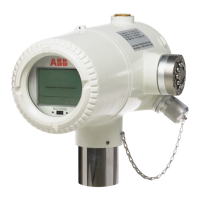2101510MNAH | NGC8200 AND PGC1000 USER MANUAL | 11
Figure 1-2: Typical multi-stream installation
1.3 Principle of operation: sample processing
To process a sample, a gas sample is extracted from the pipeline. The sample conditioning module
removes any particulates or liquids entrained in the sample. The sample conditioning module also acts
as a bypass loop to ensure that sample lag time is minimized. The sample is then transported to the
analyzer and analyzed using gas chromatography.
Analysis results provide mole percent values for each gas component. These values are used to
perform energy calculations. Calculated values include: gas compressibility, real relative density,
Btu/CV value, liquid GPM, Wobbe index, methane number and several other optional calculated
values. Gas compressibility selections include NX-19, AGA-8 detail, single virial summation factor, ISO
summation factor and none (a factor of one is used).
Analysis results are stored in the analyzer. Once a sample processing cycle is completed, the sample
is vented from the analyzer. Analysis results can be collected directly from the analyzer using the
operator interface (PCCU) or the analyzer can be configured to transmit results to other systems using
any of the supported communication protocols.
2 Hardware description
Table 2-1: Analyzer specifications
heater
heater
Supply Voltage 10.5–16 VDC 10.5–16 VDC 21–28 VDC 21–28 VDC
Recommended AC Power
Supply
14.5 V 14.5 V 25 V 25 V
Current (see note 1)
Avg. Power Consumption
After Startup (see note 2)
Up to 7 Watts Up to 53 Watts Up to 7 Watts Up to 64 Watts
-22 F to 140 F (-30 C to 60 C)
0 F to 131 F (-18 C to 55 C)
With environmental enclosure -40 F to 131 F (-40 C to 55 C)
Repeatability ±0.125 Btu at 1,000 Btu (±0.0125%) ambient;
±0.25 Btu at 1,000 Btu (±0.025%) over temperature range of 0 F
131 F (-18 C to 55 C)

